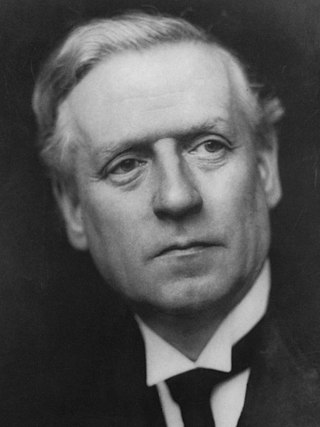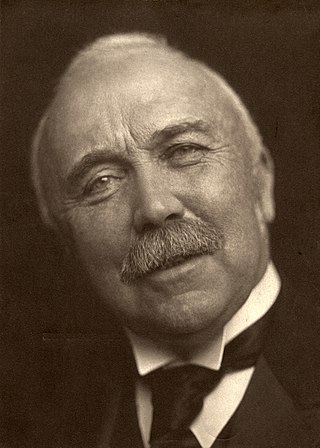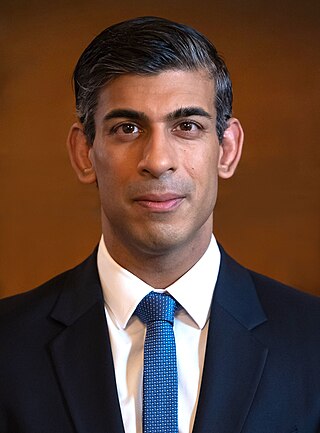Following is a list of past and present Members of Parliament (MPs) of the Parliament of the United Kingdom whose surnames begin with Y.
Colour key: Conservative Labour Liberal Liberal Democrats Scottish Unionist Party Tory Whigs
Following is a list of past and present Members of Parliament (MPs) of the Parliament of the United Kingdom whose surnames begin with Y.
Colour key: Conservative Labour Liberal Liberal Democrats Scottish Unionist Party Tory Whigs

The Liberal Party was one of the two major political parties in the United Kingdom, along with the Conservative Party, in the 19th and early 20th centuries. Beginning as an alliance of Whigs, free trade-supporting Peelites, and reformist Radicals in the 1850s, by the end of the 19th century, it had formed four governments under William Gladstone. Despite being divided over the issue of Irish Home Rule, the party returned to government in 1905 and won a landslide victory in the 1906 general election. Under prime ministers Henry Campbell-Bannerman (1905–1908) and H. H. Asquith (1908–1916), the Liberal Party passed reforms that created a basic welfare state. Although Asquith was the party leader, its dominant figure was David Lloyd George.

The United Kingdom is a constitutional monarchy where executive power is delegated by legislation and social conventions to a unitary parliamentary democracy. From this a hereditary monarch, currently King Charles III, serves as head of state while the Prime Minister of the United Kingdom, currently Sir Keir Starmer since 2024, serves as the elected head of government.

The 1983 United Kingdom general election was held on Thursday 9 June 1983. It gave the Conservative Party under the leadership of Margaret Thatcher the most decisive election victory since that of the Labour Party in 1945, with a majority of 144 seats and the first of two consecutive landslide victories.

The 1929 United Kingdom general election was held on Thursday, 30 May 1929, and resulted in a hung parliament. Ramsay MacDonald's Labour Party won the most seats in the House of Commons for the first time despite receiving fewer votes than the Conservative Party, led by Prime Minister Stanley Baldwin. The Liberal Party, led again by former Prime Minister David Lloyd George, regained some of the ground lost in the 1924 general election and held the balance of power. Parliament was dissolved on 10 May.

The 1923 United Kingdom general election was held on Thursday 6 December 1923. The Conservatives, led by Prime Minister Stanley Baldwin, won the most seats, but Labour, led by Ramsay MacDonald, and H. H. Asquith's reunited Liberal Party gained enough seats to produce a hung parliament. It is the most recent UK general election in which a third party won over 100 seats and the most narrow gap, of a "mere" 100 seats, between the first and third parties since. The Liberals' percentage of the vote, 29.7%, has not been exceeded by a third party at any general election since.

The 1918 United Kingdom general election was called immediately after the Armistice with Germany which ended the First World War, and was held on Saturday, 14 December 1918. The governing coalition, under Prime Minister David Lloyd George, sent letters of endorsement to candidates who supported the coalition government. These were nicknamed "Coalition Coupons", and led to the election being known as the "coupon election". The result was a massive landslide in favour of the coalition, comprising primarily the Conservatives and Coalition Liberals, with massive losses for Liberals who were not endorsed. Nearly all the Liberal MPs without coupons were defeated, including party leader H. H. Asquith.

The December 1910 United Kingdom general election was held from 3 to 19 December. It was the last general election to be held over several days and the last to be held before the First World War.

The 1906 United Kingdom general election was held from 12 January to 8 February 1906. The Liberals, led by Prime Minister Henry Campbell-Bannerman, won a landslide majority at the election. The Conservatives led by Arthur Balfour, who had been in government until the month before the election, lost more than half their seats, including party leader Balfour's own seat in Manchester East, leaving the party with its fewest recorded seats ever in history until 2024. The election saw a 5.4% swing from the Conservative Party to the Liberal Party, the largest-ever seen at the time. This has resulted in the 1906 general election being dubbed the "Liberal landslide", and is now ranked alongside the 1931, 1945, 1983, 1997, 2001, and 2024 general elections as one of the largest landslide election victories.

The Liberal Party is a liberal political party in the United Kingdom that was founded in 1989 as a continuation of the original Liberal Party by members who opposed its merger with the Social Democratic Party (SDP) to form the Liberal Democrats. The party holds five local council seats. The party promotes a hybrid of both classical and social liberal tendencies.
A hung parliament is a term used in legislatures primarily under the Westminster system to describe a situation in which no single political party or pre-existing coalition has an absolute majority of legislators in a parliament or other legislature. This situation is also known as a balanced parliament, or as a parliament under no overall control (NOC),. A hung parliament may result in a coalition government, a minority government, or a snap election if a government cannot be formed.

The Leader of His Majesty's Most Loyal Opposition, more commonly referred to as the Leader of the Opposition, is the person who leads the Official Opposition in the United Kingdom. The position is seen as the shadow head of government of the United Kingdom and thus the shadow prime minister of the United Kingdom.

Sir Nicholas William Peter Clegg is a British retired politician and media executive who served as Deputy Prime Minister of the United Kingdom from 2010 to 2015 and as Leader of the Liberal Democrats from 2007 to 2015. He was Member of Parliament (MP) for Sheffield Hallam from 2005 to 2017. An "Orange Book" liberal, he has been associated with both socially liberal and economically liberal policies.

The 2006 Canadian federal election was held on January 23, 2006, to elect members to the House of Commons of Canada of the 39th Parliament of Canada.

The 2010 United Kingdom general election was held on Thursday 6 May 2010, to elect Members of Parliament to the House of Commons. The election took place in 650 constituencies across the United Kingdom under the first-past-the-post system. The election resulted in a large swing to the opposition Conservative Party led by David Cameron similar to that seen in 1979, the last time a Conservative opposition had ousted a Labour government. The governing Labour Party led by the prime minister Gordon Brown lost the 66-seat majority it had previously enjoyed, but no party achieved the 326 seats needed for a majority. The Conservatives won the most votes and seats, but still fell 20 seats short. This resulted in a hung parliament where no party was able to command a majority in the House of Commons. This was only the second general election since the Second World War to return a hung parliament, the first being the February 1974 election. This election marked the start of Conservative government for the next 14 years.
An independent, non-partisan politician or non-affiliated politician is a politician not affiliated with any political party or bureaucratic association. There are numerous reasons why someone may stand for office as an independent.
The Scottish Liberal Democrats is a liberal, federalist political party in Scotland, part of UK Liberal Democrats. The party holds 4 of the 129 seats in the Scottish Parliament and 6 of the 59 Scottish seats in the House of Commons.

The Liberal Democrats are a liberal political party in the United Kingdom, founded in 1988. The current leader of the party is Ed Davey. They are the third-largest party in the United Kingdom, with 72 members of Parliament (MPs) in the House of Commons. They have 84 members of the House of Lords, four members of the Scottish Parliament, one member in the Welsh Senedd, and more than 3,000 local council seats. The Liberal Democrat Conference formulates the party's policies.

The Group of the Alliance of Liberals and Democrats for Europe was the liberal–centrist political group of the European Parliament from 2004 until 2019. It was made up of MEPs from two European political parties, the Alliance of Liberals and Democrats for Europe Party and the European Democratic Party, which collectively form the Alliance of Liberals and Democrats for Europe.

Renew Europe (Renew) is a liberal, pro-European political group of the European Parliament founded for the ninth European Parliament term. The group is the successor to the Alliance of Liberals and Democrats for Europe (ALDE) group which existed during the sixth, seventh and eighth terms from 2004 to 2019, and under a variety of other names in earlier Parliaments. Renew Europe in the European Committee of the Regions is the sister group of Renew Europe.